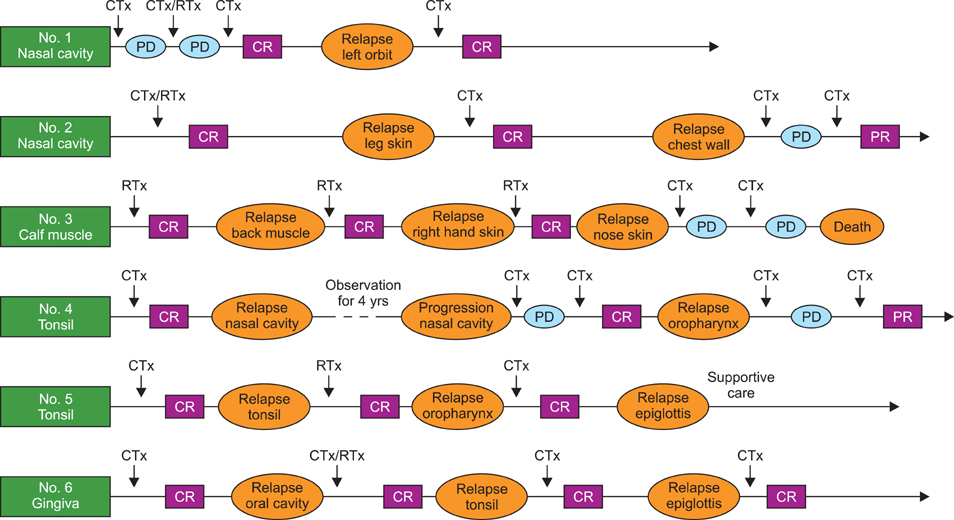Korean J Hematol.
2012 Sep;47(3):202-206. 10.5045/kjh.2012.47.3.202.
Extranodal natural killer/T-cell lymphoma with long-term survival and repeated relapses: does it indicate the presence of indolent subtype?
- Affiliations
-
- 1Division of Hematology-Oncology, Department of Medicine, Samsung Medical Center, Sungkyunkwan University School of Medicine, Seoul, Korea. wskimsmc@skku.edu
- 2Division of Hematology/Oncology, Department of Internal Medicine, Korea University Medical Center, Seoul, Korea.
- 3Department of Pathology, Korea University Medical Center, Seoul, Korea.
- 4Department of Pathology, Samsung Medical Center, Sungkyunkwan University School of Medicine, Seoul, Korea.
- KMID: 2251954
- DOI: http://doi.org/10.5045/kjh.2012.47.3.202
Abstract
- BACKGROUND
Extranodal natural killer (NK)/T-cell lymphoma is a subtype of lymphoma that is derived from NK cells. It is considered as an aggressive form of non-Hodgkin's lymphoma because of frequent relapses and resistance to treatment. Relapsed NK/T-cell lymphoma often follows a fulminant course that is refractory to conventional chemotherapy treatment.
METHODS
Several patients with extranodal NK/T-cell lymphoma showed long-term survival in spite of frequent relapses. Thus, the medical records of patients diagnosed with extranodal NK/T-cell lymphoma from 1995 to 2007 were reviewed and assessed.
RESULTS
Of the 140 cases reviewed, 6 were selected (4.29%). Each of these patients had a minimum of 3 relapses or disease progression during the follow-up period, and their median overall survival was 66 months (range, 42-89 months). They were grouped according to the atypical clinical behavior observed: (1) repeated relapses or progression (> or =3 times) during follow-up; and (2) long-term survival of more than 40 months, as the longest overall survival median was previously considered at approximately 40 months. The clinicopathological and laboratory characteristics of these patients were similar to those of other extranodal NK/T-cell lymphoma patients. However, 5 of the studied cases involved relatively lower expression of the proliferation-related antigen Ki-67 (<40-50%), indicating less proliferative activity. Clinically, they showed delayed relapse for at least 20 months after the initial complete remission.
CONCLUSION
Our observations suggest that the clinical behavior of some extranodal NK/T-cell lymphoma patients differs from the typical clinical course.
Keyword
MeSH Terms
Figure
Reference
-
1. Kim GE, Cho JH, Yang WI, et al. Angiocentric lymphoma of the head and neck: patterns of systemic failure after radiation treatment. J Clin Oncol. 2000. 18:54–63.2. Chim CS, Ma SY, Au WY, et al. Primary nasal natural killer cell lymphoma: long-term treatment outcome and relationship with the International Prognostic Index. Blood. 2004. 103:216–221.
Article3. Kim BS, Kim TY, Kim CW, et al. Therapeutic outcome of extranodal NK/T-cell lymphoma initially treated with chemotherapy result of chemotherapy in NK/T-cell lymphoma. Acta Oncol. 2003. 42:779–783.
Article4. Lee J, Suh C, Park YH, et al. Extranodal natural killer T-cell lymphoma, nasal-type: a prognostic model from a retrospective multicenter study. J Clin Oncol. 2006. 24:612–618.
Article5. Ng SB, Lai KW, Murugaya S, et al. Nasal-type extranodal natural killer/T-cell lymphomas: a clinicopathologic and genotypic study of 42 cases in Singapore. Mod Pathol. 2004. 17:1097–1107.
Article6. Au WY, Kim SJ, Yiu HH, et al. Clinicopathological features and outcome of late relapses of natural killer cell lymphomas 10-29 years after initial remission. Am J Hematol. 2010. 85:362–363.
Article7. Takeuchi K, Yokoyama M, Ishizawa S, et al. Lymphomatoid gastropathy: a distinct clinicopathologic entity of self-limited pseudomalignant NK-cell proliferation. Blood. 2010. 116:5631–5637.
Article8. Kim SJ, Kim BS, Choi CW, et al. Treatment outcome of front-line systemic chemotherapy for localized extranodal NK/T cell lymphoma in nasal and upper aerodigestive tract. Leuk Lymphoma. 2006. 47:1265–1273.
Article9. Kim SJ, Kim BS, Choi CW, et al. Ki-67 expression is predictive of prognosis in patients with stage I/II extranodal NK/T-cell lymphoma, nasal type. Ann Oncol. 2007. 18:1382–1387.
Article10. Kren L, Depowski P, Wu A. Sinonasal (angiocentric) T/NK cell lymphoma: report of a case with a -12-year history free of recurrent/residual disease and a sudden deterioration. Cesk Patol. 2002. 38:113–116.11. Cohen JI, Kimura H, Nakamura S, Ko YH, Jaffe ES. Epstein-Barr virus-associated lymphoproliferative disease in non-immunocompromised hosts: a status report and summary of an international meeting, 8-9 September 2008. Ann Oncol. 2009. 20:1472–1482.
Article
- Full Text Links
- Actions
-
Cited
- CITED
-
- Close
- Share
- Similar articles
-
- Extranodal NK/T cell lymphoma
- Single Pleural Relapse of a Nasal-Type Extranodal Natural Killer/T-Cell Lymphoma: A Case Report
- Extranodal NK/T-Cell Lymphoma, Nasal Type, Extranasal and Ulcerative Blister Variant, Case Report
- A Case of Natural Killer T-cell Lymphoma of the Tongue
- A Case of Extranodal Natural Killer/T Cell Lymphoma Combined With Actinomycosis


